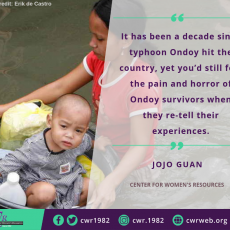The Center for Women’s Resources joins the Filipino people in commemorating the 51st anniversary of the declaration of Martial Law, one of the darkest moments in Philippine history under the Marcos dictatorship. Fifty one years later, women continue to face the same crisis, corruption, and brutal forms of political repression.
We remember the courageous and fierce women of the resistance that continue to inspire us today. We remember trade union activist, Elsa “Liza” Balando, who was killed by military forces; community organizer, Rizalina Ilagan, who was forcibly disappeared; student writers, Liliosa Hilao and Nimfa “Nona” Del Rosario; and Maria Lorena Barros who was instrumental in mobilizing women’s resistance against the Marcos dictatorship.
Tens of thousands were killed, imprisoned, tortured, and were never seen again by their families under the Marcos Sr. regime. More than half a century later, women face the same conditions under the dictator’s son.
The son’s Anti-Terror Law is the father’s Martial Law
In recent months, we have seen increasing cases of use of the Anti-Terror Law against human rights defenders and activists. With its ambiguous and sweeping definitions, it has empowered authorities to label activists and human rights defenders as terrorists or enemies of the state.
Many of the individuals and activists charged by Anti Terror Law, those included in the terrorist list, and those subjected to relentless attacks are rights defenders who are at the forefront of the fight against neoliberal development and repressive state policies impacting women’s and people’s lives.
From July 2016 to December 2022, there were 66 women victims of extrajudicial killings. Amongst them are educators, health activists, human rights advocates, and small farmers opposing destructive development projects in their communities.
Meanwhile, enforced disappearances remain rampant. Labor organizer Loi Magbanua is yet to be surfaced since her enforced disappearance in May 2022. This is the same case with peasant organizers Cha Pampoza and Elgene Mungcal, who went missing in Tarlac. There are also 162 women political prisoners as of June 2022, including human rights workers, development workers, writers, peasant organizers, journalists, and youth. These individuals have been detained without due process, often on trumped-up charges, and are denied their basic rights while in custody. The imprisonment of these women not only silences their voices but also serves as a warning to others who dare to speak out against injustices. The government’s lack of action and transparency in addressing these cases has only fueled public outrage and further eroded trust in the justice system and undermines the country’s “commitment to upholding human rights”.
Despite these relentless attacks and the worsening economic and social crisis, we stand firm, committed, and grounded. It is with the same courage and grit that we reaffirm our commitment to hold tyrants, plunderers, and rights violators accountable. It is in this way that we honor the brave women and men who fought the same battle before us. #

